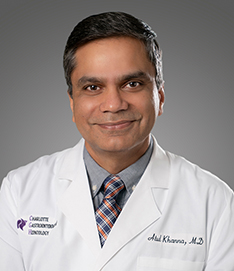Q&A with Atul Khanna, MD on Pancreatic Cancer Awareness Month
Atul Khanna, MD is a physician at Charlotte Gastroenterology who specializes in endoscopic ultrasound (EUS), endoscopic retrograde cholangiopancreatography (ERCP), advanced interventional endoscopy, and adult gastroenterology. Dr. Khanna is located at Charlotte Gastro’s Randolph Road office.
In light of pancreatic cancer awareness month, read our insightful Q&A on pancreatic cancer with Dr. Atul Khanna regarding Charlotte Gastroenterology, cancer research, and advocacy.
What does Charlotte Gastroenterology do for the Charlotte community to help pancreatic cancer patients?
With three advanced endoscopists and a team of gastroenterologists, Charlotte Gastro provides consultation and procedures in early diagnosis and comprehensive GI care for patients at risk or diagnosed with pancreatic cancer.
Are there any symptoms or criteria to know if you need to go to a doctor or get screened?
At present no screening guidelines are available for the general population. There are certain high-risk genetic mutations and family history of pancreatic cancer in which screening guidelines is available.
MRI, MRCP, and EUS can be used to screen high-risk individuals. If you have known family history of pancreatic cancer, seek consultation with a gastroenterologist on your next steps.
Is there anything to do to prevent this form of cancer?
One of the risk factors for pancreatitis cancer is chronic pancreatitis. Heavy alcohol use is also associated with chronic pancreatitis and tobacco/smoking is also one of the modifiable risk factors for the disease.
How does a patient get diagnosed and what are the next steps?
Diagnosis is usually made with imaging studies.
A patient typically would present with symptoms of abdominal pain or jaundice. A CT scan is typically an initial test, noticing a pancreatic mass. This is followed by an endoscopy ultrasound performed by a gastroenterologist to obtain biopsies from the mass and a pathological diagnosis then would be confirmed.
After confirmation, a consultation with a surgeon, oncologist, and radiation oncologist would be required.
What would you wish to say to a patient recently diagnosed?
Between available surgical options, chemotherapy, and immunotherapy treatments, these all can be individualized to minimize side effects and improve the quality of life. Treatment usually involves a multidisciplinary approach.
I would encourage patients and their family members to stay engaged. Ask questions from specialists, as they can guide them into making suitable choices between available treatment options.
What would you like to see happen with research or statistics in patients with pancreatic cancer?
Overall, I would like to see more research in surgical advances, endoscopy management of complications such as duodenal obstruction, and pain control with EUS-guided celiac plexus block. These all benefit the patient with management, but still, the 5-year survival is dismally low at 20%.
Early diagnosis at the surgically resectable stage before cancer is locally advanced or has metastasized would help improve survival rate in patients.
In the future, chemotherapy and newer individualized immunotherapy-directed treatments would be better tolerated and have more favorable outcomes.
Do you have a personal connection to pancreatic cancer or a special story you would like to share in light of pancreatic cancer awareness month?
I have a special connection with all my patients.
One of my patients early in my practice in medicine I remember was a mechanical engineer. He had locally advanced disease at the time of diagnosis. The patient had a very loving and caring family. With treatment and labs and additional support, he lived for two years.
During these two years, he required multiple endoscopy interventions as he developed obstruction of the bile duct as well as duodenal obstruction. During my multiple interactions with the patient, he was always hopeful, but realistic regarding management options. Even towards his end of life, he was full of gratitude and showed a dignified way of living with this difficult diagnosis. It was a humbling experience taking care of the gentle soul.
Dr. Khanna states he will always remember this patient and this humbling experience.
How would you urge someone to keep hope during a diagnosis?
Treatment can be difficult along with a long recovery. It’s easy for one to lose hope and become depressed and disheartened. Support from family members and having faith can help with these upsetting times. Also staying engaged in activities of interest, maintaining a routine, and staying socially involved with friends and family is of utmost importance.
To read more about Dr. Khanna or Charlotte Gastroenterology’s services, visit www.charlottegastro.com or call (704) 377- 0246.
